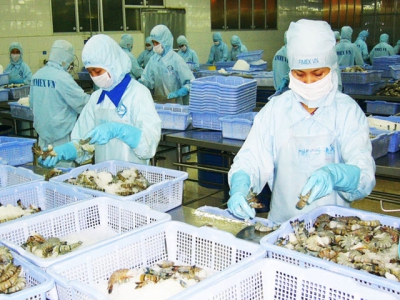Concerns for lack of material shrimps at the end of the year

Soc Trang province has thoroughly prepared procedures to restore the shrimp production chain, but due to low prices, farmers have become hesitant about the year-end shrimp crop.
Shrimp consumption in Soc Trang can still maintain a steady pace thanks to factories implementing '3 on the spot' production, but the price of some types of raw shrimp has plummeted. Photo: TL.
Small shrimp's prices plummeted
Currently, only approximately 30 - 40% of seafood enterprises in the Mekong Delta might be able to restore production after Covid-19. Soc Trang province is one of the localities in the region that had flexibly implemented solutions to control and prevent the spread of Covid-19.
However, after monitoring the raw shrimp market since July 19th (when the provinces in the region respectively implemented Directive 16), shrimp farmers in Soc Trang have learned that shrimp of all kinds has decreased in prices by an average of VND 20,000 - 30,000/kg.
Large size shrimp still has a good price, but 70-100 kg sized shrimps suffered the heaviest price reduction. The price of 100 kg sized shrimps has decreased to VND 50,000 - 55,000/kg, while it was VND 90,000 - 100,000/kg during the first six months of the year.
Facing the situation, from August 15th until the present date, Soc Trang has deployed several countermeasures. The province starts zoning areas, divided into many disease control degrees (red, orange, yellow, green), then loosens the quarantine. In particular, the five communes in the red zone (very high risk) possess little area for shrimp farming. Therefore, the communes in the remaining regions have received cooperation from local authorities and functional agencies, setting up hotlines so as to facilitate and remove bottlenecks in a timely manner from transporting the seed to the farming area to transporting raw shrimp to the processing plant.
Soc Trang is highly regarded for performing Covid-19 control well, helping shrimp prices recover, but the increase is still small compared to the beginning of the outbreak. Meanwhile, shrimp feed prices increasing by 10-20% has clearly affected the mental state of shrimp farmers. They became more cautious and afraid of losses considering they want to stock up shrimp seeds for the end-of-the-year crop.
Maintain farming areas to "overcome the waves"
According to Ms. Quach Thi Thanh Binh, Deputy Director of Soc Trang Fisheries Sub-Department, the aquaculture situation in the whole province is still stable, shrimp diseases are controlled well, so the damage is much lower compared to the same period last year. Most of the first crop’s farming areas have achieved high economic efficiency thanks to high productivity.
Furthermore, units participating in the province's commodity chain still ensure safety for production without any backlog on agricultural products as well as disruption on the production chain. The only difficulty at the moment is that the price of commercial shrimp remains at a decreasing rate. In particular, the price of shrimp purchased at farmers' ponds has sharply dropped.
Even so, Soc Trang is still trying their hardest to improve the situation. Changes that emerged from the application of new technologies in shrimp farming in Soc Trang have created positive results, especially the application of high-density farming procedures in tarpaulin-lined ponds. Farmers have also paid more attention to selecting varieties, choosing the time of stocking, and following the locality’s guidelines.
Restore the production chain step by step
As forecasted by shrimp enterprises, the shrimp export market is going to show signs of increase again, exclusively for large-sized shrimps. Accordingly, Soc Trang province has introduced solutions to maintain production, harvest and consumption of aquatic products in the remaining three months of the year.
Soc Trang Department of Agriculture and Rural Development will coordinate with localities to review shrimp acreage and output, actively organize to promote product consumption linkages between businesses, wholesale markets with cooperative groups, cooperatives and local shrimp farmers. The Department, together with localities, will found and train harvesting teams to improve the quality of post-harvest products and facilitate the farming area’s on-site service, and at the same time coordinate with the Department of Industry and Trade to regulate, distribute and find output consumption sources for products.
According to the Directorate of Fisheries, in the first eight months of the year, brackish water shrimp production reached over 622,000 tons, up 6.8% over the same period in 2020. To be more specific, tiger shrimp reached 187,300 tons, while whiteleg shrimp reached 397,000 tons.
Seafood export turnover in eight months reached over USD 5.6 billion, up 7.1% over the same period last year. However, in August, seafood exports dropped sharply for tuna, pangasius and shrimp, down 29.7% compared to the previous month.
Có thể bạn quan tâm
 Opportunities for seafood exports in the last months of the year
Opportunities for seafood exports in the last months of the year Main seafood export markets such as the US, EU, Japan... are recovering, with the Covid-19 pandemic controlled, demand is high, opening up opportunities
 Exports of shrimp, tra fish, tuna simultaneously dropped
Exports of shrimp, tra fish, tuna simultaneously dropped Exports of shrimp, tra fish, tuna and other key aquatic products have simultaneously experienced a sharp drop in August due to the impact of Covid-19.
 Farmers stop shrimps farming with no profit made
Farmers stop shrimps farming with no profit made In Khanh Hoa, shrimp prices plummeted, consumption was slow, price of raw materials increased, farmers stopped stocking because there was no profit